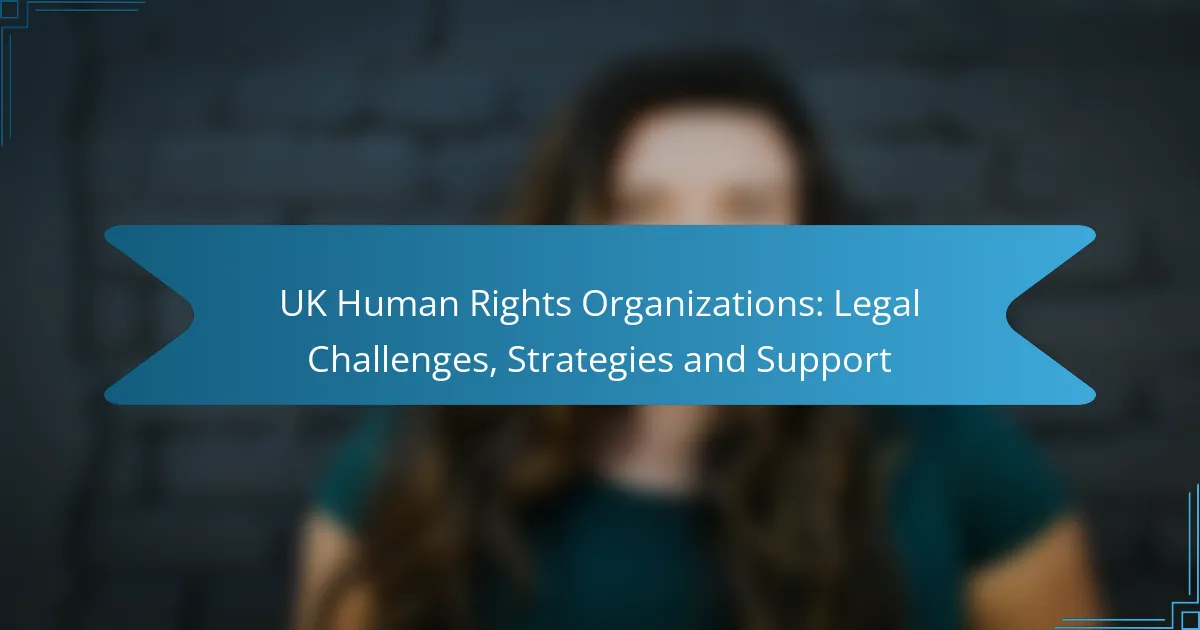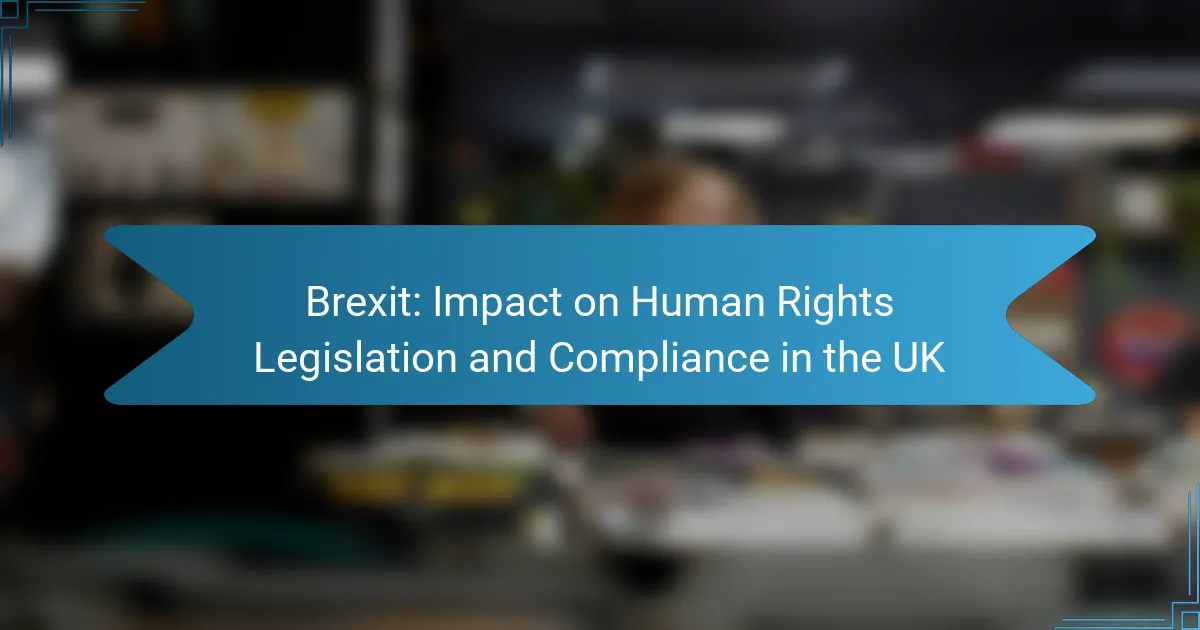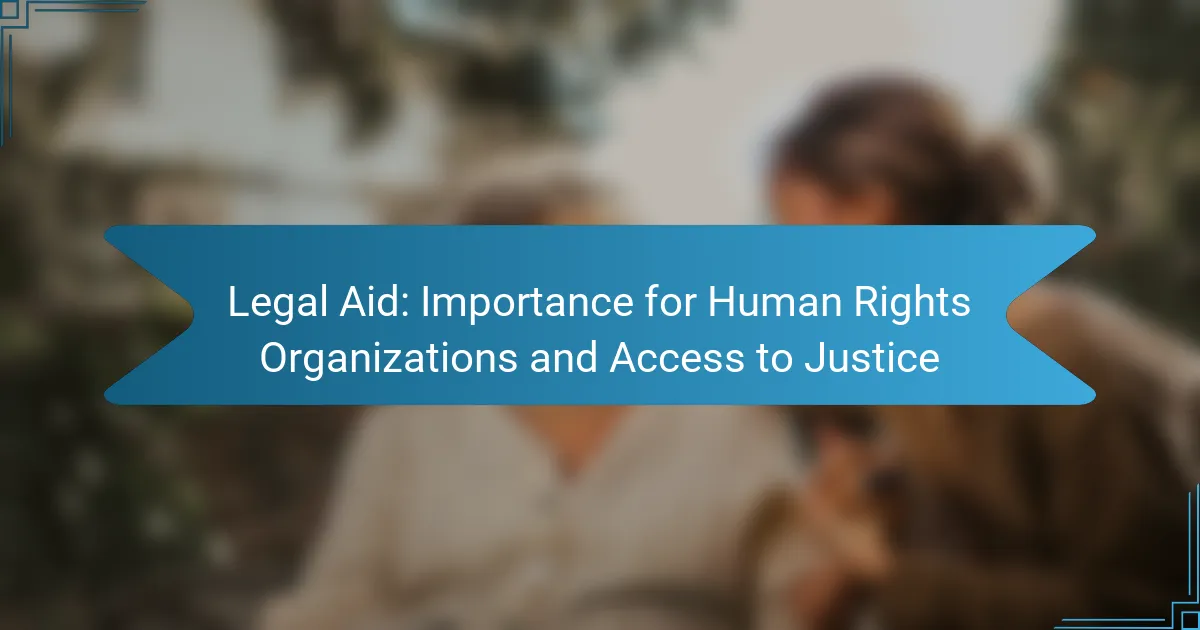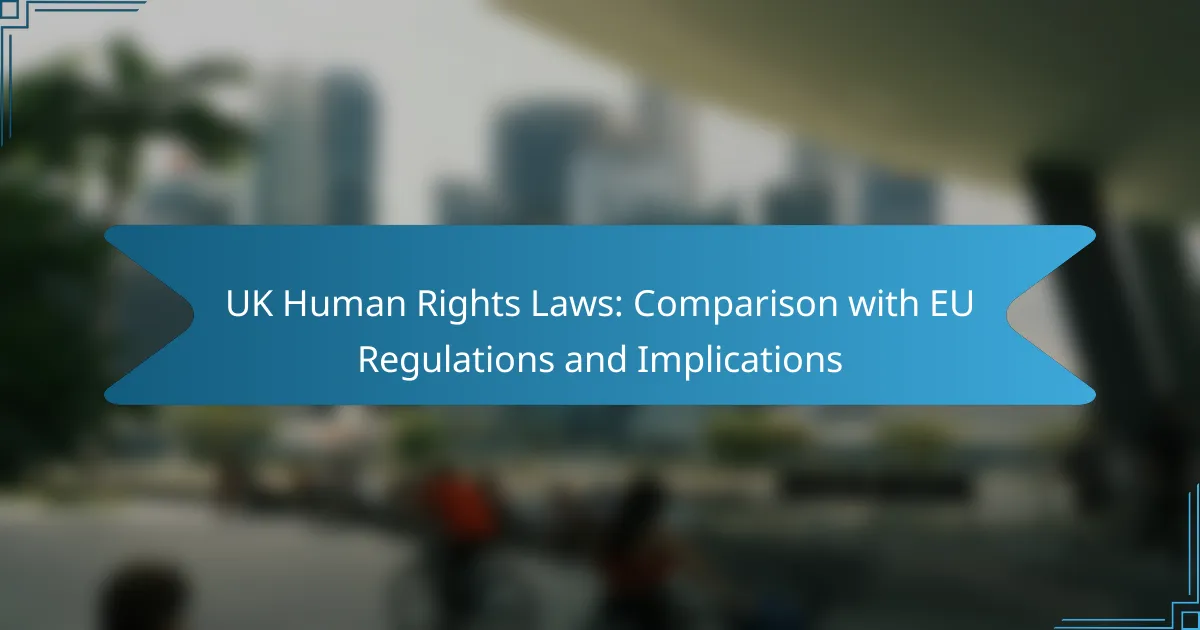UK human rights organizations play a crucial role in advocating for justice and equality, yet they face significant legal challenges that impede their effectiveness. These challenges include restrictions on judicial reviews, funding constraints, and evolving legislation. To overcome these obstacles, these organizations employ diverse strategies such as advocacy, public awareness campaigns, and legal assistance, while also providing essential support to individuals experiencing rights violations.
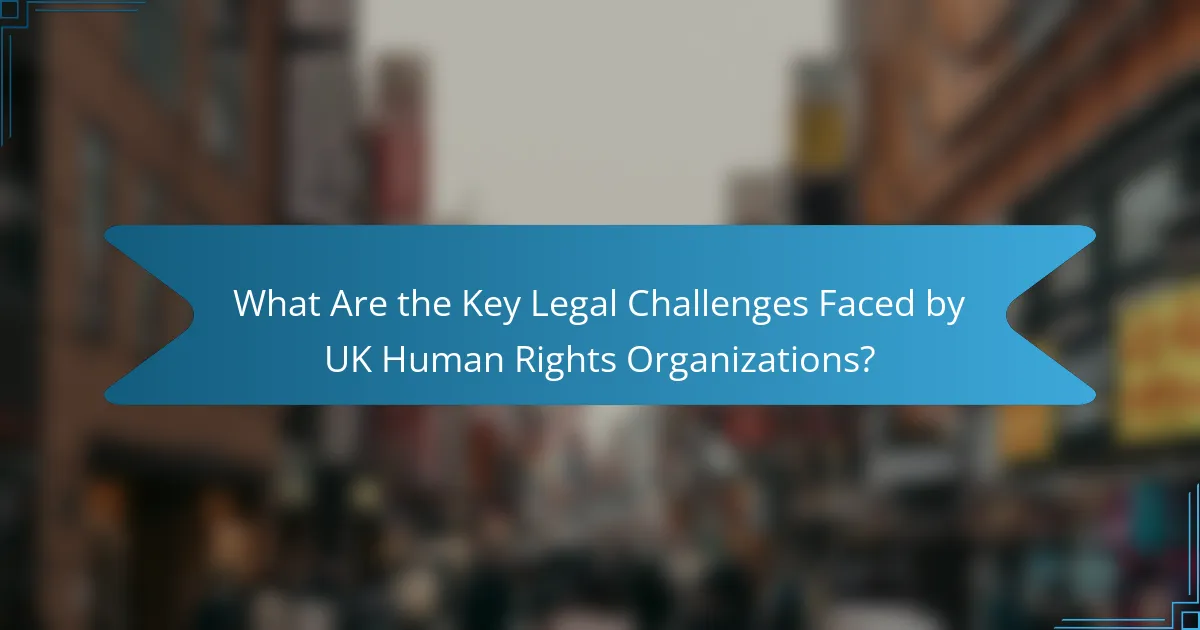
What Are the Key Legal Challenges Faced by UK Human Rights Organizations?
UK human rights organizations encounter several significant legal challenges that hinder their ability to operate effectively. These challenges include limitations on judicial reviews, funding issues, public perception hurdles, legislative changes, and conflicts with international law.
Judicial Review Limitations
Judicial review is a critical tool for human rights organizations to challenge unlawful actions by public authorities. However, recent reforms have imposed stricter rules on who can apply for judicial review and have increased the costs associated with these legal actions, making it more difficult for organizations to pursue cases.
Organizations must navigate these limitations carefully, often prioritizing cases that have the highest chance of success or the most significant impact. Understanding the legal framework and potential barriers is essential for effective advocacy.
Funding Constraints
Funding is a persistent challenge for UK human rights organizations, as many rely on grants and donations that can fluctuate. Economic downturns or shifts in donor priorities can lead to significant funding shortfalls, impacting their operations and legal capabilities.
To mitigate funding constraints, organizations should diversify their funding sources, including exploring partnerships with private sectors and crowdfunding initiatives. Establishing a robust financial strategy can help ensure sustainability in challenging times.
Public Perception Issues
Public perception plays a crucial role in the effectiveness of human rights organizations. Negative media portrayals or public skepticism can diminish support and complicate advocacy efforts. Organizations often face backlash for their positions on controversial issues, which can lead to a decline in public trust.
To address public perception issues, organizations should engage in proactive communication strategies, including public education campaigns and transparent reporting on their activities and impacts. Building strong community relationships can also enhance credibility and support.
Legislative Changes Impact
Legislative changes can significantly affect the landscape in which human rights organizations operate. New laws or amendments can restrict rights, alter funding mechanisms, or impose additional compliance requirements, which may hinder organizations’ ability to function effectively.
Staying informed about legislative developments is crucial for organizations to adapt their strategies. Engaging in advocacy to influence policy changes and participating in consultations can help mitigate negative impacts from new legislation.
International Law Conflicts
Conflicts between UK law and international human rights standards can pose challenges for organizations advocating for compliance with global norms. When domestic laws diverge from international obligations, organizations may find themselves in a complex legal landscape.
To navigate these conflicts, organizations should be well-versed in both UK and international law, leveraging international frameworks to support their cases. Collaborating with international bodies can also provide additional resources and legitimacy to their efforts.
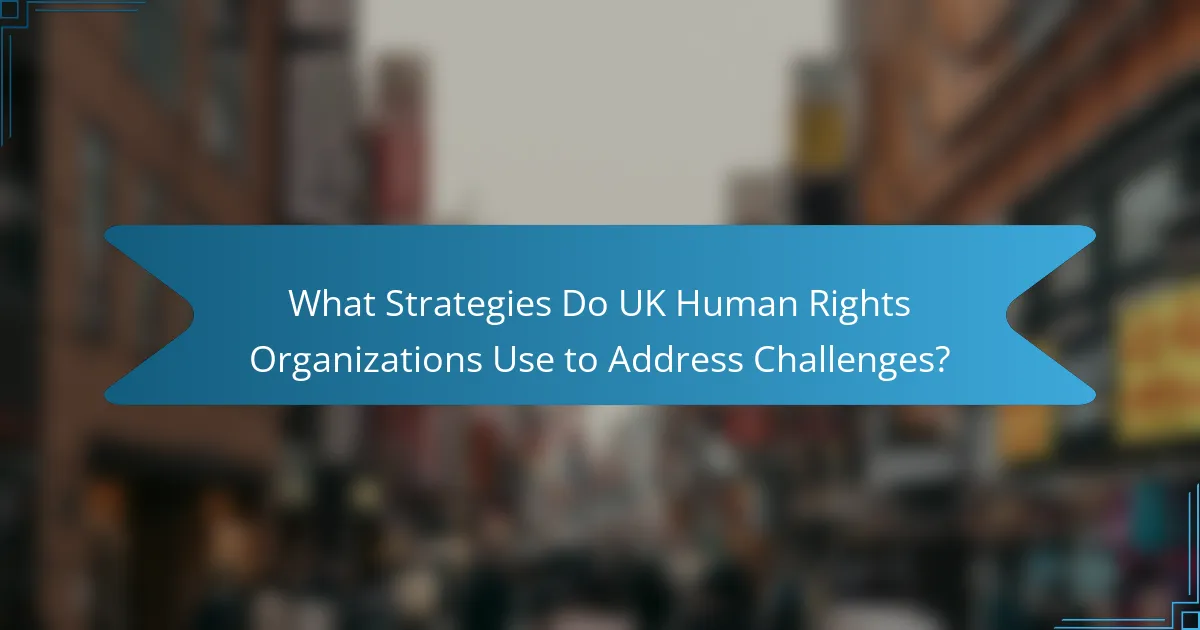
What Strategies Do UK Human Rights Organizations Use to Address Challenges?
UK human rights organizations employ various strategies to tackle legal challenges, including advocacy, public awareness, legal assistance, and partnerships. These approaches help them navigate complex legal landscapes and amplify their impact on human rights issues.
Advocacy and Lobbying
Advocacy and lobbying are crucial strategies for UK human rights organizations to influence policy and legislation. By engaging with lawmakers and government officials, these organizations aim to promote human rights protections and challenge unjust laws.
Effective lobbying often involves presenting evidence-based arguments and mobilizing public support. Organizations may organize campaigns that highlight specific issues, encouraging citizens to contact their representatives and demand action.
Public Awareness Campaigns
Public awareness campaigns are designed to educate the general public about human rights issues and mobilize support for change. These campaigns often utilize social media, traditional media, and community events to reach a broad audience.
By raising awareness, organizations can shift public opinion and pressure decision-makers to take action. Successful campaigns often include storytelling, visuals, and calls to action that resonate with the community.
Legal Assistance Programs
Legal assistance programs provide support to individuals facing human rights violations. These programs may offer free or low-cost legal advice, representation, and resources to help victims navigate the legal system.
Organizations often prioritize cases that highlight systemic issues, aiming to set legal precedents that benefit broader communities. They may also collaborate with pro bono lawyers to extend their reach and effectiveness.
Partnerships with Other NGOs
Partnerships with other non-governmental organizations (NGOs) enhance the effectiveness of human rights efforts. Collaborating allows organizations to pool resources, share expertise, and amplify their voices on critical issues.
These partnerships can take various forms, including joint campaigns, shared research initiatives, and coordinated advocacy efforts. By working together, NGOs can address complex human rights challenges more comprehensively and effectively.
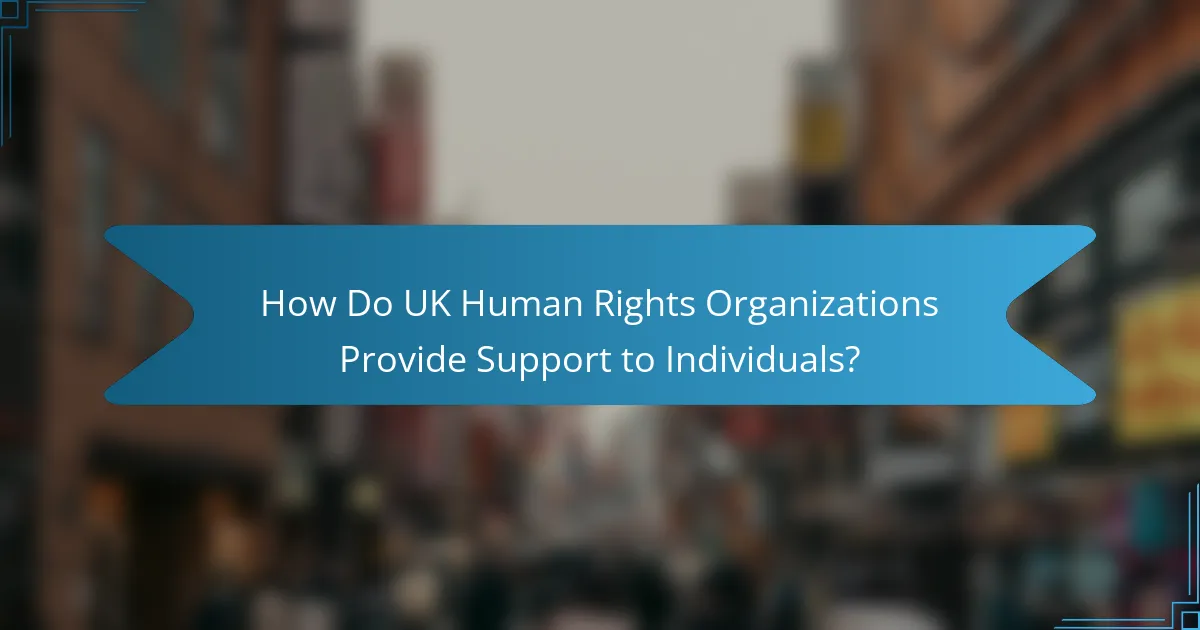
How Do UK Human Rights Organizations Provide Support to Individuals?
UK human rights organizations offer vital support to individuals facing legal challenges, discrimination, or violations of their rights. They provide a range of services, including legal representation, crisis intervention, educational resources, and community outreach initiatives.
Legal Representation Services
Legal representation services are crucial for individuals navigating complex human rights cases. Organizations often provide access to solicitors who specialize in human rights law, ensuring that clients receive expert legal advice and support throughout their cases.
These services may include assistance with filing claims, representation in court, and guidance on legal rights. Many organizations operate on a pro bono basis or offer services at reduced fees, making legal support accessible to those who may not afford it.
Crisis Intervention Support
Crisis intervention support is designed to assist individuals in immediate danger or distress due to human rights violations. Organizations often have dedicated hotlines or support teams that can provide urgent assistance and advice.
This support may involve connecting individuals with safe housing, counseling services, or emergency legal aid. Timely intervention can be critical in preventing further harm and ensuring that individuals receive the help they need as quickly as possible.
Educational Resources and Workshops
Educational resources and workshops are essential for empowering individuals with knowledge about their rights. Many organizations offer training sessions, seminars, and informational materials that cover various topics, including legal rights, discrimination, and how to seek help.
These resources help individuals understand their rights and the legal processes involved, enabling them to advocate for themselves more effectively. Workshops often include practical exercises and case studies to enhance learning and engagement.
Community Outreach Initiatives
Community outreach initiatives aim to raise awareness about human rights issues and connect individuals with available resources. Organizations often engage in public campaigns, informational events, and partnerships with local groups to reach underserved populations.
These initiatives can help build trust within communities, encouraging individuals to seek support when facing rights violations. Outreach efforts may also include distributing literature, hosting community forums, and providing direct access to legal and social services.
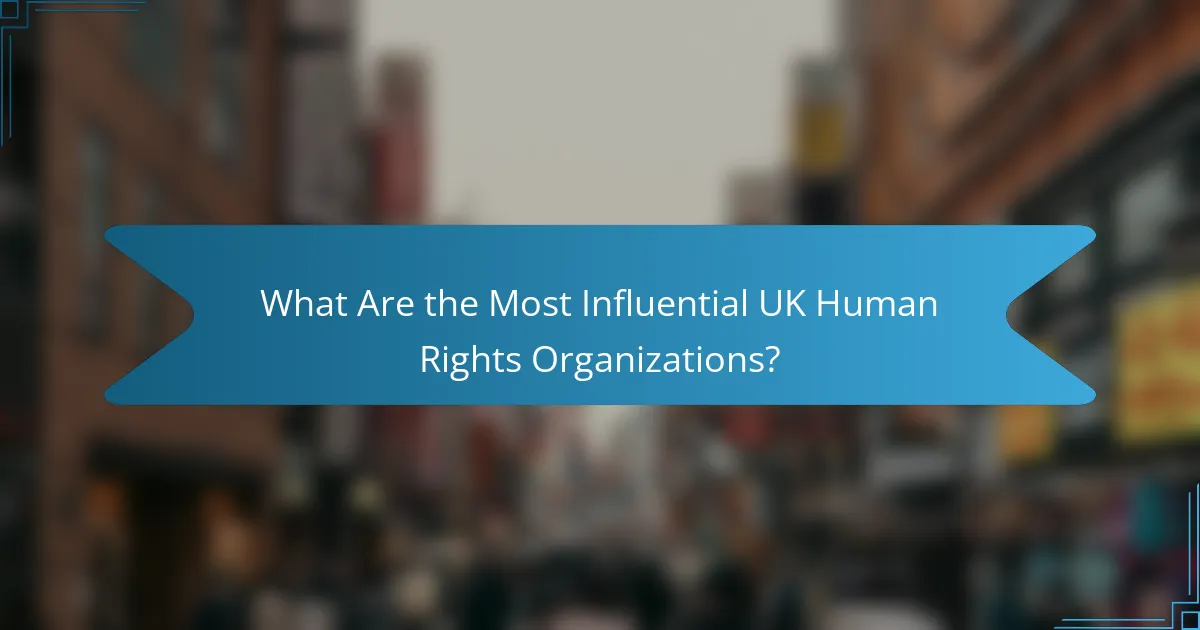
What Are the Most Influential UK Human Rights Organizations?
The UK is home to several influential human rights organizations that advocate for legal protections and support for individuals facing rights violations. These organizations employ various strategies, including legal challenges, public awareness campaigns, and policy advocacy to promote human rights across the country.
Liberty
Liberty is a prominent human rights organization in the UK that focuses on protecting civil liberties and promoting social justice. It engages in legal challenges against government actions that infringe on individual rights, often representing cases in higher courts to set precedents.
The organization also conducts public campaigns to raise awareness about issues such as privacy rights, freedom of expression, and the right to protest. Liberty provides resources and support for individuals seeking to understand and assert their rights in various situations.
Amnesty International UK
Amnesty International UK is part of the global Amnesty movement, dedicated to fighting for human rights worldwide. The UK branch focuses on advocacy, campaigning, and lobbying to influence government policies and practices regarding human rights.
Amnesty conducts research and publishes reports on human rights abuses, providing a platform for victims’ voices. They also mobilize public support through petitions and awareness campaigns, encouraging individuals to take action on pressing human rights issues.
Human Rights Watch UK
Human Rights Watch UK is the UK section of the international organization that monitors and reports on human rights violations. It conducts in-depth investigations and produces detailed reports that highlight abuses both domestically and globally.
The organization advocates for policy changes and accountability, using its findings to engage with policymakers and the public. Human Rights Watch also works to educate the public about human rights issues through various outreach programs and initiatives.
Equality and Human Rights Commission
The Equality and Human Rights Commission (EHRC) is a statutory body in the UK that promotes equality and protects human rights. It has the authority to enforce laws related to discrimination and equality, ensuring compliance with the Equality Act.
EHRC provides guidance and support to individuals and organizations on issues related to equality and human rights. It also conducts inquiries and investigations into systemic discrimination, aiming to influence policy and improve practices across various sectors.
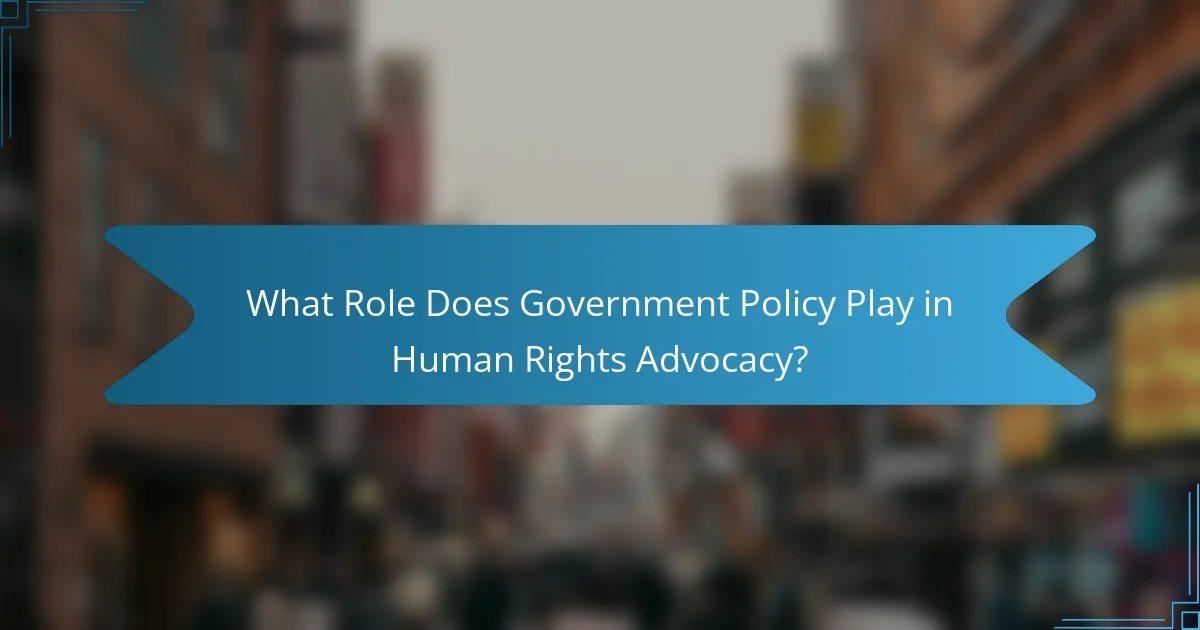
What Role Does Government Policy Play in Human Rights Advocacy?
Government policy significantly influences human rights advocacy by establishing legal frameworks, funding mechanisms, and regulatory environments that either support or hinder human rights organizations. Policies can shape the priorities of these organizations and determine the resources available for their initiatives.
Impact of Brexit on Human Rights
Brexit has created uncertainty regarding the future of human rights protections in the UK, as the country is no longer bound by EU regulations that provided a robust framework for various rights. This shift raises concerns about potential regressions in areas such as workers’ rights, anti-discrimination laws, and environmental protections.
Human rights organizations must now navigate a landscape where domestic policies may diverge from previously established EU standards. This could lead to a weakening of protections if the UK government chooses to prioritize economic interests over human rights considerations.
Advococates are encouraged to closely monitor government proposals and engage in lobbying efforts to ensure that human rights remain a priority in post-Brexit legislation. Building coalitions with other organizations can amplify their influence and help safeguard essential rights.
